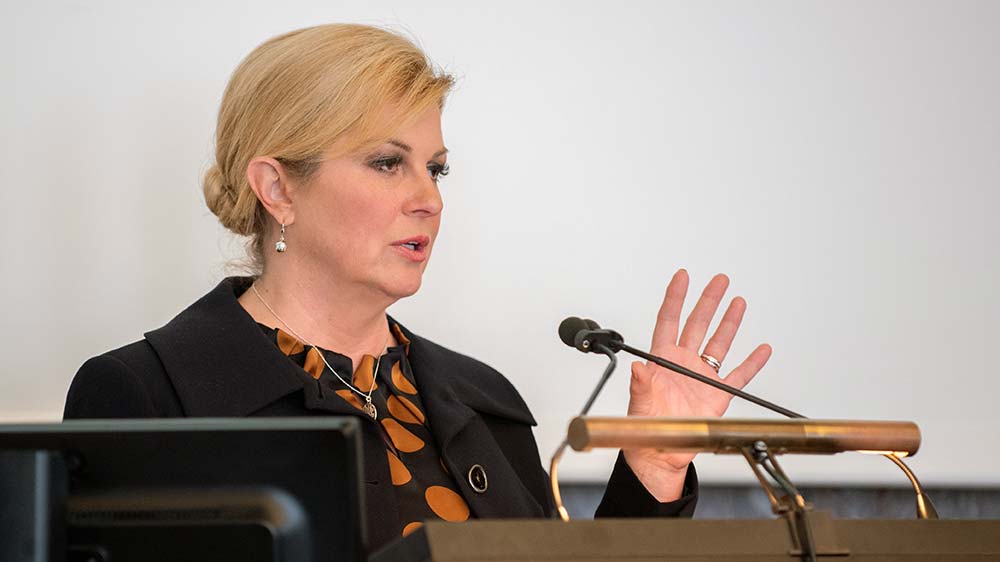Navigation auf uzh.ch
Navigation auf uzh.ch

From Stettin in the Baltic to Trieste in the Adriatic, in 1946 Sir Winston Churchill saw a line drawn across Europe. In a speech in Fulton, Missouri, he introduced the phrase “Iron Curtain”. That was a few months before another memorable speech Churchill made here in Zurich on 19 September 1946. In the main lecture hall of the University of Zurich, Churchill swore to keep the European family together, and spoke of “a kind of United States of Europe”, a structure which would uphold the principles of peace, security and freedom in the splintered continent. On Tuesday this week, Kolinda Grabar-Kitarović spoke from the same august lectern to deliver a Special Churchill Lecture. The title of the speech by the Croatian President, “Europe – challenges and perspectives in an ever more complex world”, promised to be a kind of follow-up to Churchill’s famous address.
Like Churchill, Grabar-Kitarović spoke of the need to keep Europe together against the backdrop of an increasing split across the continent. She began by questioning whether the curtain dividing Europe was really banished to history. “I would say that the Iron Curtain has become a silk or cotton curtain,” said Grabar-Kitarović. She pointed out that there were still differences between the countries that had been part of the Eastern Block and the Western European countries, i.e. between the old and new EU member states. The differences related to living standards and infrastructure, as well as differences in mentality.
The president warned of a stratification of the EU with a layer of second-class citizens, and presented the “Three-Seas Initiative” as a means to reduce the differences between countries. The initiative, which aimed at increasing cooperation in the areas of business, infrastructure and energy policy by 12 EU states located between the Baltic, the Adriatic and the Black Sea and launched by Croatia and Poland in 2015, had initially been misunderstood as a separatist project. But, said Grabar-Kitarović, the aim had always been to create a cohesive region within Europe.
The differences between EU countries were one of four challenges and perspectives in Europe that Grabar-Kitarović identified in her speech. Another one was the future expansion of the EU. She explicitly spoke in favor of opening conversations about membership with current non-EU countries in South-East Europe, and spoke of her disappointment that Albania and North Macedonia would now have to wait longer to talk about joining. “There will only be peace, security and stability in South East Europe when all the countries are fully integrated into the EU,” said Grabar-Kitarović. Existing animosities between South East European countries should be dealt with from within the framework of the EU. In addition, membership negotiations can sometimes have the effect of kick-starting transformation processes, and at the same time make it possible to monitor such processes, said Grabar-Kitarović, a former diplomat who served as Croatian ambassador in Washington DC.
She also talked of a “rebranding” of the EU to create a strong Europe capable of representing its values on the global stage alongside major powers such as USA and China. The image of the EU in most countries was of a “set of institutions far away in Brussels”. When EU commissioners and parliament members visited Croatia, she always invited them to walk around the old town of Zagreb with her and to visit the university and answer students’ questions – because “young people are the future leaders of Europe”.
The president, who was in Switzerland on an official state visit, concluded her speech by giving a preview of Croatia’s presidency of the EU Council for the first half of 2020. Grabar-Kitarović also mentioned possible future negotiations with Switzerland. If no decision is made on the framework agreement between Switzerland and the EU and on the recognition of the Swiss stock exchange by the EU by the end of this year, then Croatia will be leading the negotiations. “Croatia is a true friend of Switzerland,” Grabar-Kitarović smilingly assured the audience. She saw no reason not to extend the stock exchange equivalence. But, she reminded her listeners, the EU had to uphold the principle of solidarity and could not allow itself to be split owing to particular interests.
Despite the many challenges facing the EU, which were testing its resilience, the Croatian President was optimistic about the future of the organization. Returning to Churchill’s “Let Europe arise!”, the head of state concluded: “Europe has risen, but it is up to us not to let it fall when it stumbles. One of those moments has now come. We must stay together and work together to get Europe back on its feet.”
Melanie Keim is a freelance journalist. English translation by Caitlin Stephens, UZH Communications.